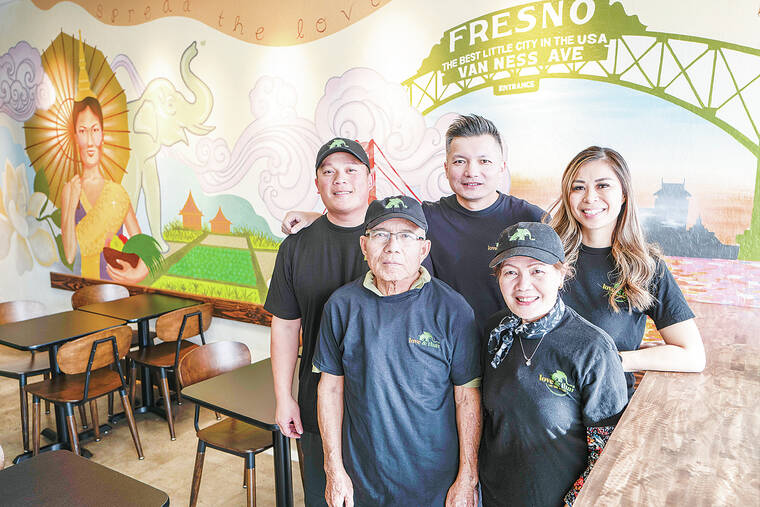David Rasavong’s cultural pride is evident all throughout his restaurant.
It’s on the wall of family portraits and where a stunning mural depicts his family’s journey from Laos to California. It’s on the menu filled with Lao and Thai dishes like the crispy coconut rice salad of Nam Khao and the stir-fried rice noodles of Pad See Ew.
And it’s in the fact that Love &Thai in Fresno, California, restaurant is open at all.
A baseless accusation grounded in a racist stereotype about Asian food using dog meat brought a six-month barrage of harassment so heated that Rasavong, 41, closed down its previous location over fears for his family’s safety.
His earlier restaurant had itself only been open for seven months when a so-called animal welfare crusader in May implied on social media that a pitbull tied up at an unconnected home next door was going to be served on the menu.
A day after the initial commentary, vitriolic statements, voicemails and calls rained down. Rasavong’s body still tenses up when recounting, in particular, a call from an elderly woman.
“She was so disgusted by me and yelling and screaming, and the only thing I can remember hearing her say at the end was ‘Go back to the country you came from you dog-eating mother-effer,’” Rasavong recently told The Associated Press.
Within days, he closed that restaurant because it no longer felt safe between the harassment and people loitering in the parking lot outside of business hours.
The false accusation tapped into a longstanding slur against Asian cuisines and cultures that has persisted in the U.S. for over 150 years, dating back to the xenophobia that grew in the U.S. after Chinese immigrants started arriving in more visible numbers in the 1800s and other Asian communities followed. It’s also one that Asian American communities are fighting against.
It may be astonishing to some that a claim rooted in a racist stereotype took down a family’s restaurant three years after “Stop Asian Hate” became a rallying cry. But for many Asian Americans and Pacific Islanders, it’s something they’ve heard before as an insult or under the guise of a “joke,” along with other negative reactions to the actual foods of their cultures. In December, a comedian received some backlash for dressing like a UPS delivery driver and walking into an Asian restaurant with caged puppies for a social media video.
There is hope though that more people will learn to tell truth from trope. Since the pandemic first fueled anti-Asian hostilities, AAPI communities themselves have tried to take control of the narrative that Asian food is “dirty,” “weird” yet “exotic.” Furthermore, the appetite to learn about food from the Asian diaspora has only grown across traditional and new media.
Still, there were moments where Rasavong felt like nobody, even media, was on his side.
He said a few reporters approached him assuming the claims were true.
But he soon received tons of community support, and the closure ended up being a new beginning.
A shopping center property manager offered him the chance to take over a suite vacated by another restaurant. Nkundwe P. van Wort-Kasyanju, a graphic designer in the Netherlands, and Los Angeles-based interior designer Danny Gonzales proffered their services for free. Hana Luna Her, a local artist, painted the mural. By the Nov. 3 grand opening of the new space, Love &Thai definitely felt the love. The place was bustling all day, Rasavong said, and the city presented a proclamation.
Rasavong is holding onto the belief that he went through this whole saga for a reason.
“There’s a journey that we’re supposed to go on,” said Rasavong, who declined to say if he’ll pursue legal action. “Don’t get me wrong. People need to realize this business is not easy … But you know, we believe in what we’re doing and so far so good.”
In actuality, consuming dog meat is something that has happened in various parts of the world for centuries, where they weren’t seen as domesticated family pets, said Robert Ku, author of “Dubious Gastronomy: The Cultural Politics of Eating Asian in the USA.” Greeks and Romans referenced it.
The French also ate dog meat during World War II.
But when Chinese immigrants came to the U.S., it was linked to them as part of “the myths that the Chinese were these bizarre people who had bizarre diets,” Ku said. “It was one of the attractions of actually going to Chinese restaurants back in the day because it came with ‘danger.’”
As other Asian immigrant groups came, the stereotype spread to include them.
“This is a real just blurring of the Asian identity where it doesn’t matter if you’re Thai or Korean or Vietnamese or Cambodian. You’re all the same,” Ku said.

